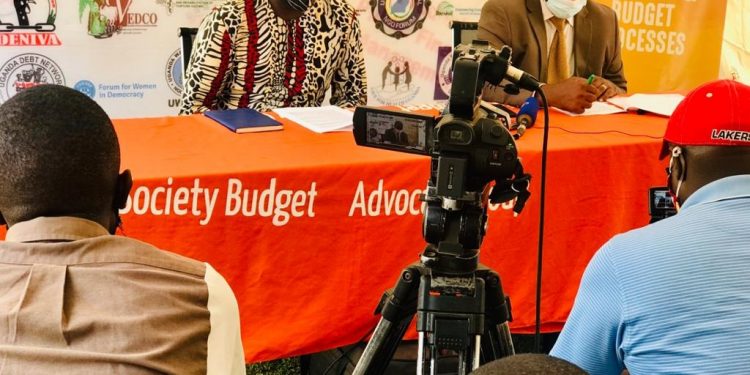Civil Society Organisations have warned Gov’t on the over increasing public debt stock, saying that debt servicing continues to exert fiscal pressure on the country’s budget. This according to them is manifested in Uganda’s interest payments rising from sh1.7Trillion in FY 2016/17 to sh4.1Trillion in FY 2020/21.
According to Bank of Uganda’s report on performance of the economy September 2020, Uganda’s public debt stock by June 2020 stood at sh56.53Trillion, growing sh10.33Trillion equivalent to 22.4 percentage growth from UGX 46.20 trillion as at June 2019.
“The current public debt refinancing poses a potential fiscal risk to the country, it has increased from sh5.9Trillion in FY 2018/19 to sh7.4Trillion in FY 2020/21 translating into a 25 percent increase,” said Julius Mukunda, the ED CSBAG.
This was on Sunday 18th October 2020 during a Press Conference on key actions that Government must undertake to mitigate COVID 19 effects, revamping the economy and improving livelihoods that took place at CSBAG offices in Kampala.
‘Uganda’s liquidity ratio to debt is very weak’
According to Mukunda, much as Uganda’s debt to Gross Domestic Product( GDP) ratio remains below the 50 percent threshold, the country’s liquidity ratio to debt is very weak, at 22 percent in FY 2019/20 against the IMF standard of 15 percent this puts Uganda in a vulnerable state.
He said that where CSBAG recognizes the importance of Government borrowing to finance fiscal deficit, there’s need to improve on sustainable debt management mechanisms such as improved project identification, establishing appraisal process funds as well as restructuring or renegotiating non performing projects.
Mukunda said that non performing projects lock a lot of funds and have reduced fiscal space, approving projects whose counterpart funding has been secured in the budget.
‘Address the underlying causes of poor project management’
Uganda currently experiences a low return on investments with an average return of 0.7 dollars for every 1 dollar invested in capital infrastructure compared to USD 6 returns globally. According to Mukunda, as of December 2019, Uganda had loan commitments amounting to $8.723 Billion of which about $4.16 B had been disbursed posting a 47.7% disbursement rate.
“We call for a comprehensive and transparent process to address the underlying causes of poor project management including assessing performance of Accounting Officers and Project Managers. Secondly, Government needs to address public land acquisition to improve right of way. This will go a long way in reducing delay,” he said.
Strengthen the financial sector
Patrick Rubangakene, the Budget Policy Specialist at CSBAG said that COVID-19 has adversely affected the country’s financial sector and exposed weaknesses in regulations, monitoring and lack of oversight of the sector. The aforementioned challenges in the financial sector are responsible for the recent mobile money fraud and the on-going litigation between customers and commercial banks.
“ For instance, In all these cases, predatory lending practices, inside bank lending, inside trading of mortgages and fraudulent borrowers are some of the key reasons why high interest rates, and less financial deepening in the sector.
He said that there has been a reluctance on the part of Bank of Uganda to exercise its powers to reign in uncooperative financial institutions and blacklist fraudulent borrowers who continue to dent the image of the financial sector.
“It is the duty of Government, particularly BOU to protect its citizens from unfair banking practices but above all ensure that the banking industry remains resilient and strong. There is need for good business ethics and stronger consumer protection enforced by Bank of Uganda but more importantly: Creation of a rural financial inclusion fund which will be financed by a 0.5 percent annual profit of commercial banks,” said Rubangakene










